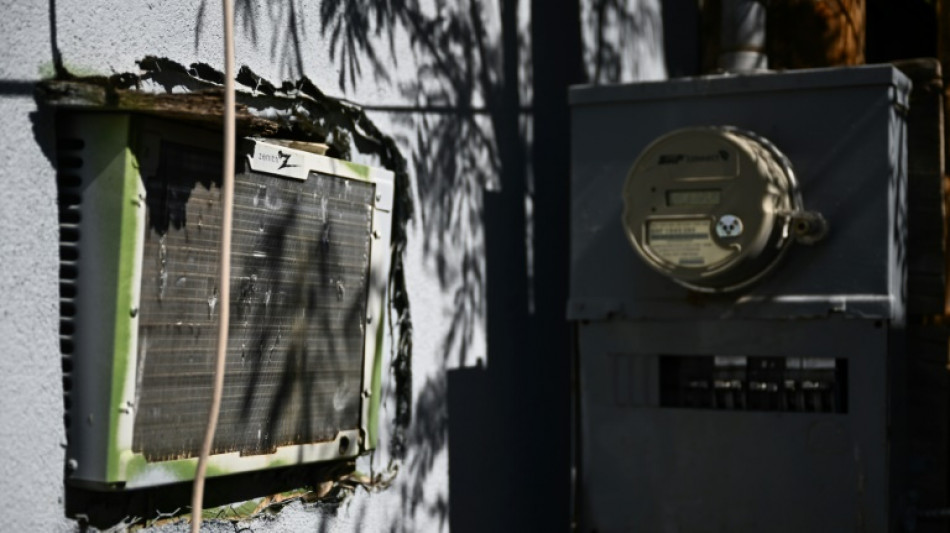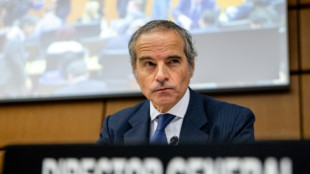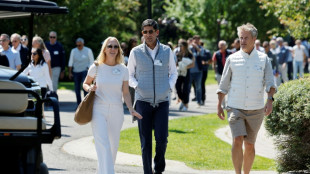
-
 Fela Kuti: first African to get Grammys Lifetime Achievement Award
Fela Kuti: first African to get Grammys Lifetime Achievement Award
-
'Schitt's Creek' star Catherine O'Hara dead at 71

-
 Curran hat-trick seals 11 run DLS win for England over Sri Lanka
Curran hat-trick seals 11 run DLS win for England over Sri Lanka
-
Cubans queue for fuel as Trump issues energy ultimatum

-
 France rescues over 6,000 UK-bound Channel migrants in 2025
France rescues over 6,000 UK-bound Channel migrants in 2025
-
Surprise appointment Riera named Frankfurt coach

-
 Maersk to take over Panama Canal port operations from HK firm
Maersk to take over Panama Canal port operations from HK firm
-
US arrests prominent journalist after Minneapolis protest coverage

-
 Analysts say Kevin Warsh a safe choice for US Fed chair
Analysts say Kevin Warsh a safe choice for US Fed chair
-
Trump predicts Iran will seek deal to avoid US strikes

-
 US oil giants say it's early days on potential Venezuela boom
US oil giants say it's early days on potential Venezuela boom
-
Fela Kuti to be first African to get Grammys Lifetime Achievement Award

-
 Trump says Iran wants deal, US 'armada' larger than in Venezuela raid
Trump says Iran wants deal, US 'armada' larger than in Venezuela raid
-
US Justice Dept releases new batch of documents, images, videos from Epstein files

-
 Four memorable showdowns between Alcaraz and Djokovic
Four memorable showdowns between Alcaraz and Djokovic
-
Russian figure skating prodigy Valieva set for comeback -- but not at Olympics

-
 Barcelona midfielder Lopez agrees contract extension
Barcelona midfielder Lopez agrees contract extension
-
Djokovic says 'keep writing me off' after beating Sinner in late-nighter

-
 US Justice Dept releasing new batch of Epstein files
US Justice Dept releasing new batch of Epstein files
-
South Africa and Israel expel envoys in deepening feud

-
 French eyewear maker in spotlight after presidential showing
French eyewear maker in spotlight after presidential showing
-
Olympic dream 'not over', Vonn says after crash

-
 Brazil's Lula discharged after cataract surgery
Brazil's Lula discharged after cataract surgery
-
US Senate races to limit shutdown fallout as Trump-backed deal stalls

-
 'He probably would've survived': Iran targeting hospitals in crackdown
'He probably would've survived': Iran targeting hospitals in crackdown
-
Djokovic stuns Sinner to set up Australian Open final with Alcaraz

-
 Mateta omitted from Palace squad to face Forest
Mateta omitted from Palace squad to face Forest
-
Djokovic 'pushed to the limit' in stunning late-night Sinner upset

-
 Tunisia's famed blue-and-white village threatened after record rains
Tunisia's famed blue-and-white village threatened after record rains
-
Top EU official voices 'shock' at Minneapolis violence

-
 Kremlin says agreed to halt strikes on Kyiv until Sunday
Kremlin says agreed to halt strikes on Kyiv until Sunday
-
Carrick calls for calm after flying start to Man Utd reign

-
 Djokovic to meet Alcaraz in Melbourne final after five-set marathon
Djokovic to meet Alcaraz in Melbourne final after five-set marathon
-
Italian officials to testify in trial over deadly migrant shipwreck

-
 Iran says defence capabilities 'never' up for negotiation
Iran says defence capabilities 'never' up for negotiation
-
UN appeals for more support for flood-hit Mozambicans

-
 Lijnders urges Man City to pile pressure on Arsenal in title race
Lijnders urges Man City to pile pressure on Arsenal in title race
-
Fulham sign Man City winger Oscar Bobb

-
 Strasbourg's Argentine striker Panichelli sets sights on PSG, World Cup
Strasbourg's Argentine striker Panichelli sets sights on PSG, World Cup
-
Jesus 'made love': Colombian president irks Christians with steamy claim

-
 IAEA board meets over Ukraine nuclear safety concerns
IAEA board meets over Ukraine nuclear safety concerns
-
Eurozone growth beats 2025 forecasts despite Trump woes

-
 Dutch PM-elect Jetten says not yet time to talk to Putin
Dutch PM-elect Jetten says not yet time to talk to Putin
-
Social media fuels surge in UK men seeking testosterone jabs

-
 Forest face Fenerbahce, Celtic draw Stuttgart in Europa League play-offs
Forest face Fenerbahce, Celtic draw Stuttgart in Europa League play-offs
-
US speed queen Vonn crashes at Crans-Montana, one week before Olympics

-
 Trump nominates former US Fed official as next central bank chief
Trump nominates former US Fed official as next central bank chief
-
New Dutch government pledges ongoing Ukraine support

-
 Newcastle still coping with fallout from Isak exit, says Howe
Newcastle still coping with fallout from Isak exit, says Howe
-
Chad, France eye economic cooperation as they reset strained ties


In a warming world, is an air-conditioned future inevitable?
They are ubiquitous in the United States, controversial in Europe and coveted in South Asia. As heatwaves intensify across the world, air conditioning has taken center stage.
For better or for worse, these power-hungry appliances are among the most common adaptations to a warming world. They have become a necessary tool for the survival of millions, according to experts.
But while they bring immediate, life-saving relief, air conditioners come at a cost to the climate crisis because of their enormous energy requirements.
Air conditioning is responsible for the emission of approximately one billion metric tons of carbon dioxide per year, according to the International Energy Agency (IEA), out of a total of 37 billion emitted worldwide.
It is possible to end this vicious cycle, experts say, by increasing the contribution of renewable energies, developing less energy-intensive air conditioners and augmenting them with other cooling techniques.
"There are some real purists who think that we can eliminate, but I just don't think that's feasible," Robert Dubrow, a Yale epidemiologist who specializes in the health effects of climate change, told AFP.
Access to air conditioning already saves tens of thousands of lives a year, a figure that is growing, according to a recent IEA report co-authored by Dubrow.
Studies show that the risk of heat-related death is reduced by about three-quarters for those living in homes with an air conditioner.
In the United States, where about 90 percent of households have AC, studies have highlighted the role of air conditioning in protecting the population -- and the potentially devastating effect of widespread power cuts during heatwaves.
But globally, of the 3.5 billion people living in hot climates, only about 15 percent have air conditioners at home.
- High costs, high emissions -
The number of air conditioners in the world, about two billion today, is set to skyrocket as temperatures and incomes rise.
India, China and Indonesia -- the first, second and fourth most populous countries in the world -- are among those that will see the strongest growth.
By 2050, the share of households in India equipped with air conditioners could increase from 10 to 40 percent, according to a recent study.
But such an increase in electricity consumption would be equivalent to the current total annual production of a country like Norway.
If India's future grid uses as much fossil fuels as it does today, that would mean around 120 million tons more carbon dioxide emitted annually -- or 15 percent of the country's current energy sector emissions.
The problems posed by increased air conditioning do not stop there. Running power plants also causes air pollution.
Air conditioners also generally use fluorocarbon gases as refrigerants, which have a warming power thousands of times greater than CO2 when they escape into the atmosphere.
And by discharging their hot air out into the streets, air conditioning contributes to urban heat island effects.
A 2014 study found that at night heat emitted from air-conditioning systems in city centers increased the mean air temperature by more than 1 degree Celsius (almost 2F).
Finally, due to its cost, access to air conditioning poses a major equity issue.
Once installed, the price of the electricity bill can force families to choose between cooling and other essential needs.
- 'Complementary' solutions -
For Enrica De Cian, a professor in environmental economics at Ca Foscari University in Venice, the use of AC is "an important strategy in certain conditions and in certain places."
But, she adds, it's essential to combine it with "complementary" approaches.
First, by continuing to ramp up renewable energy production, and wind down fossil fuels, so that energy used by air conditioners leads to fewer emissions.
Second, by developing and installing affordable air conditioners that consume less energy, which some companies are working on. The IEA advocates for stricter efficiency standards, but also recommends air conditioners to be set at a minimum of 24C (75F).
Beyond limiting emissions, greater efficiency would also curb the risks of power cuts linked to excessive demand. On hot days, air conditioning can account for more than half of peak consumption.
But above all, the experts hammer home the simultaneous need for spatial planning measures: including more green spaces and bodies of water, sidewalks and roofs that reflect the Sun's rays, and better building insulation.
"We have to achieve sustainable indoor cooling," said Dubrow.
The proposed solutions are "very feasible," he adds. "It's a matter of political will for them to be implemented."
O.Bulka--BTB




